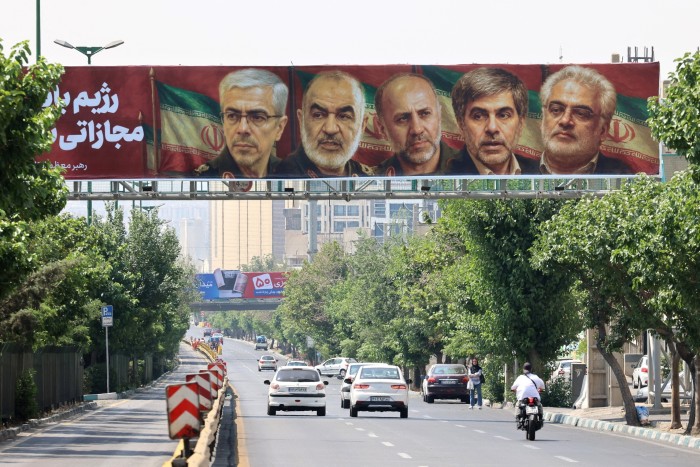Unlock the Editor’s Digest for free
Roula Khalaf, Editor of the FT, selects her favourite stories in this weekly newsletter.
Israel warned that “Tehran will burn” as it exchanged a fresh round of missile attacks with Iran and Benjamin Netanyahu said his campaign could bring down the Islamic republic.
Israeli paramedics said that 14 people had been injured in a strike on a house in the north of the country, after Iran fired a barrage of missiles towards Haifa, which is home to one of Israel’s most important ports.
Soon afterwards, Israel’s defence forces said that they were carrying out strikes on military targets in the Iranian capital Tehran, which Israel’s defence minister Israel Katz had earlier warned would “burn” if Iran continued missile assaults on urban areas.
Israel earlier struck a processing plant in Iran’s South Pars gasfield — the world’s largest, shared with neighbouring Qatar — triggering a large explosion, in a significant escalation of its campaign.
The moves — which prompted Jordan to close its airspace for the second day running — came after Netanyahu gave a public address on Friday night directed to the Iranian people in which he called on them to “stand up for your freedom” against the regime of Ayatollah Ali Khamenei.
“The objective of Israel’s operation is to thwart the Islamic regime’s nuclear and ballistic missile threat to us. As we achieve our objective, we are also clearing the path for you to achieve your freedom,” he said. “The regime does not know what hit them, or what will hit them.”
On Saturday, he threatened that Israel would “hit every site and every target of the Ayatollahs’ regime”.
“What they have felt so far is nothing compared with what they will be handed in the coming days,” he said.
Over the past year, the Israeli premier has repeatedly said he was seeking to “reshape” the Middle East. Israeli officials believe their military successes against Iran’s allies in Lebanon and Syria have created an opportunity to attack Iran when it is in its weakest position for years.
Israel’s hardening objectives and hints at seeking regime change came after a large-scale assault launched by Israel on Friday, which hit Iran’s nuclear programme and military leadership.
The strikes have primarily hit cities in central and western Iran, where the majority of the country’s military and nuclear facilities are located. In Tehran — a city of 10mn — the strikes on houses of senior regime officials hit residential areas, resulting in significant civilian casualties, including women and children.
Iran in retaliation fired hundreds of ballistic missiles at Israel overnight on Friday. A senior adviser to the commander of the Revolutionary Guards said Iran’s barrages had targeted 150 locations.
While most of the missiles were intercepted by Israel’s air defences, some made it through, with two people being killed in a strike in the town of Rishon LeZion that damaged several houses, and another being killed in an attack on Tel Aviv.
Iranian media, quoting unofficial estimates, said that 78 people had been killed and 329 injured in Iran since Israel started its campaign on Friday.
The Israeli air force said on Saturday morning that it was continuing to strike surface-to-surface missile launchers in Iran.

Israel launched its assault on Iran in the early hours of Friday, capping nearly two years of spiralling tensions in the Middle East, which has been in turmoil since Hamas’s October 7 attack on Israel.
Israeli officials said that they had launched the attack as Iran had moved perilously close to being able to make a nuclear weapon, a scenario that they have long regarded as an existential threat.
However, Iranian officials have denied they are seeking a bomb, and the most recent threat assessment issued by the US intelligence community this year concluded that Iran had not restarted the nuclear weapons programme that it suspended under international pressure in 2003.
However, Tehran has for several years been enriching uranium close to weapons grade, and is thought to have the capacity to produce sufficient fissile material required for a nuclear weapon in less than two weeks.



